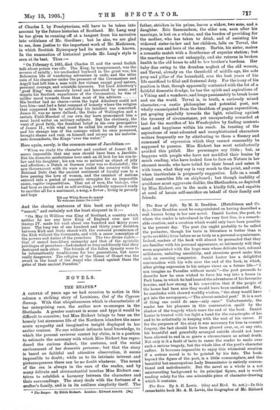The Rose of Life. By M. E. Braddon. (Hutchinson and
Co. 6s.)—Miss Braddon must be congratulated on having described a real human being in her new novel. Daniel Lester, the poet, to whom the reader is introduced in the very first line, is a remark- able creation, and a creation which would only have been possible in the present day. The poet (he ought probably to be called the poetaster, though his taste in literature is better than is quite credible) lives before us as truly as a personal acquaintance. Indeed, readers of the book will almost be persuaded that they are familiar with his personal appearance, so intimately will they seem acquainted with the huge man whose delicate tact, colossal selfishness, unfailing amiability, and atrocious greed make him such an amusing companion. Daniel Lester has a delightful conversation with his wife near the end of the book, in which, after giving expression to his unique views on a future life—" I can imagine no Paradise without meals "—the poet proceeds to describe how he once wished to force his way into a house in Park Lane, in which he had located the adventures of his favourite heroine, and how strong is his conviction that if the people of the house had been nice they would have been enchanted. But, he concludes with shrewd worldly wisdom, "the story would have got into the newspapers,—' The absent-minded poet.' It is a sort of thing one could do once—only once." Unfortunately, the reader has his pleasure in this conversation spoilt by the shadow of the tragedy which mars the end of the book. Daniel Lester is treated with too light a hand for the catastrophe of his end to be artistically in keeping with the rest of his career. If for the purposes of the story it was necessary for him to commit forgery, the fact should have been glossed over, or, at any rate, his beautiful and gracefully arranged suicide should not have been allowed to end in so grave a circumstance as actual death. Not only is it a fault of taste to cause the reader to smile over such a serious tragedy, but the whole idea of the poet's character suffers. It becomes impossible to enjoy this whimsical creation if a serious moral is to be pointed by his fate. The book, beyond the figure of the poet, is a little commonplace, and the beautiful but unscrupulous Lady Beauminster is entirely conven- tional and melodramatic. But the novel as a whole is a not uninteresting background to its principal figure, and is worth reading solely for the one admirable piece of character-drawing which it contains.






































 Previous page
Previous page